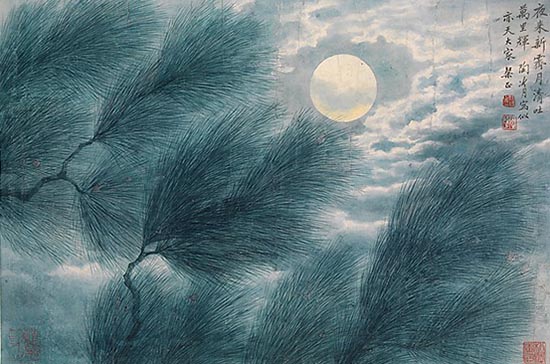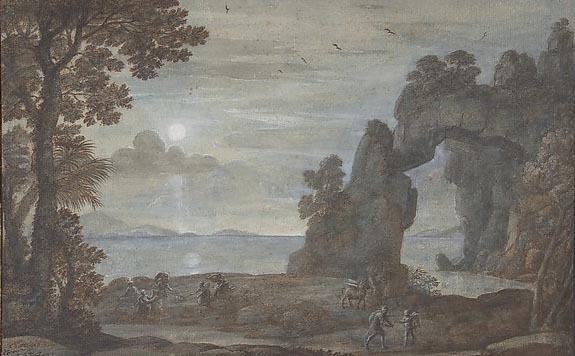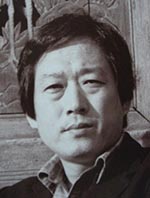이성부, 달뜨기재/ Lee Sung-bu, The Moonrise Hill

Tao Lengyue (Chinese, 1894–1985), 近代 陶冷月 月圓圖 軸/Full Moon, 20th century, Album leaf; ink and color on alum paper, The Metropolitan Museum of Art
The Moonrise Hill
Lee Sung-bu
The moon that rises over Jiri Mountain
doesn’t illuminate grass and trees and roads,
but she shines upon the traces of tears
that won’t come off from inside people’s hearts.
The stars of early autumn look closer
and the sky is a deep blue mirror.
The hearts touched by this moonlight
have disappeared in a row, intermittently,
into the mountain’s shadow, and today,
even the ghosts have stopped their wandering and shouting
and pass between shadows, dropping their heads.
I only glimpsed the moon that rises over the hill–
a moon that has seen me in the midst of quiet and yet has not spoken–
and I have collapsed on the grass to catch my breath.
Every time brightness and shadow rustle together,
I hear lost love, sorrow, and anger
rushing in again.
*Translated by Dr. Chae-Pyong (“J.P.”) Song 송재평 교수 & Annie Rashid
Korean Poetry in Translation https://jaypsong.wordpress.com

Claude Lorrain (Claude Gellée) (French, Chamagne 1604/5?–1682 Rome), Coast View with Perseus and the Origin of Coral, 1674, Pen, brown ink, brown, blue, grey wash, heightened with white gouache, The Metropolitan Museum of Art
달뜨기재
이성부
지리산에 뜨는 달은
풀과 나무과 길을 비추는 것이 아니라
사람들 마음속 지워지지 않는
눈물자국을 비춘다
초가을 별들도 더욱 가까워서
하늘이 온통 시퍼런 거울이다
이 달빛이 묻은 마음들은
한줄로 띄엄띄엄 산그림자 속으로 사라지고
귀신들도 오늘은 떠돌며 소리치는 것을 멈추어
그림자 사이로 고개 숙이며 간다
고요함 속에서 나를 보고도 말 걸지 않는
고개에 솟는 달 잠깐 쳐다보았을 뿐
풀섶에 주저앉아 가쁜 숨을 고른다
밝음과 그림자가 함께 흔들릴 때마다
잃어버린 사랑이나 슬픔 노여움 따위가
새로 밀려오는 소리를 듣는다
*달뜨기재 지리산 동쪽 웅석봉과 연결된 산줄기의 고개 이름
Jiri Mountain is located in the southern region of South Korea, spanning three provinces: North and South Jeolla, as well as Gyeongsang. Throughout Korean history, the mountain has taken up a variety of different meanings, reflecting many writers’ desires and needs of different moments in time. For some Korean writers, Jiri Mountain is a tragic figure of tumultuous modern Korean history. For others, it has been a figure of the magical, the sacred, the abundant, and the motherly. For others, Jiri Mountain has been metaphorized as a mountain of the people and resistance, but also as a mountain of death and resentment, where fierce battles were fought between the end of Japanese colonial rule and the Korean War, slaughtering many Koreans. And still yet, for others, the mountain is a space of life and hope that renews the lives of today and tomorrow.
 이성부(李盛夫, 1942-2012)
이성부(李盛夫, 1942-2012)
광주에서 태어나 경희대 국문과 졸업. 1962년 현대문학 추천으로 등단, 1967년 동아일보 신춘문예에 '우리들의 양식'이 당선됐다. 현대문학상, 한국문학 작가상, 제18회 공초문학상, 제9회 영랑시문학상 수상. 2012년 암으로 별세. 시집으로 '이성부 시집' '우리들의 양식' '백제행' '전야' '빈 산 뒤에 두고' 등이 있다.







